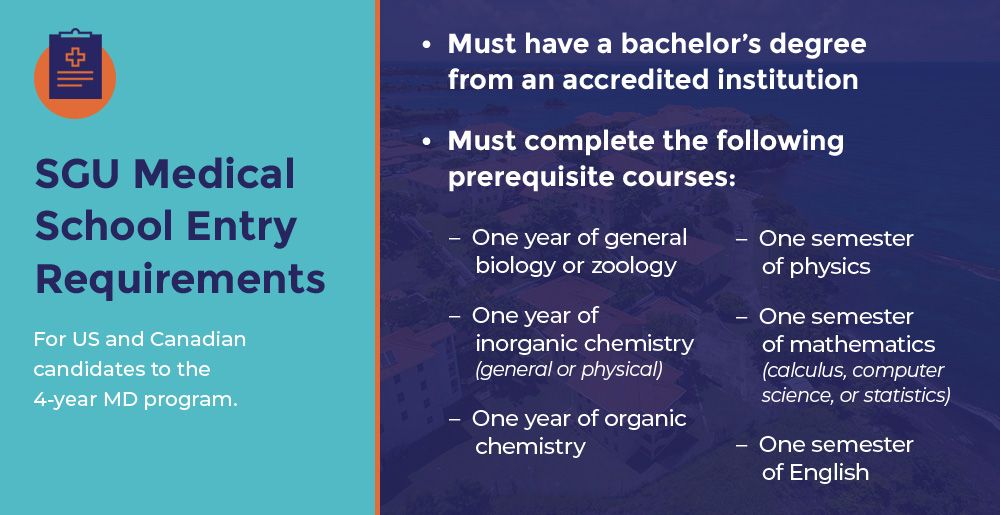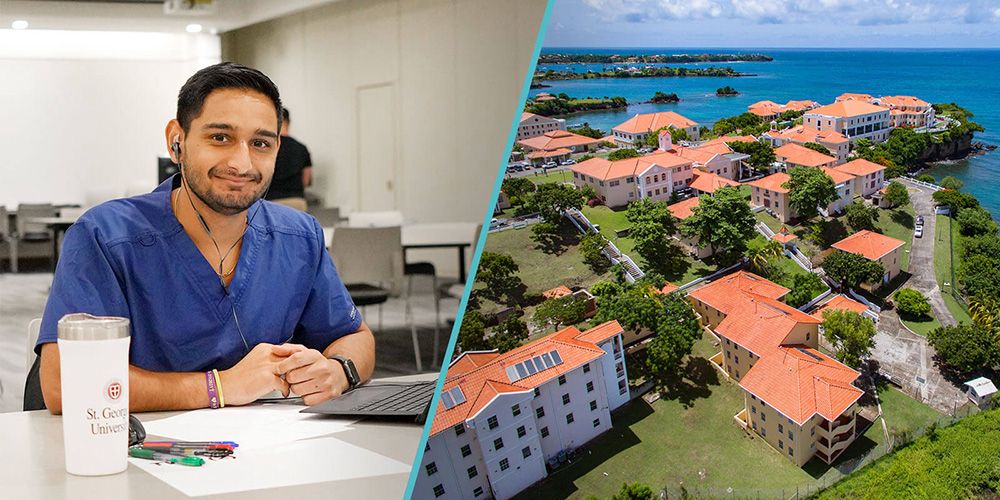You may already know that medical school is in your future, but actually deciding on a Doctor of Medicine (MD) program is no easy task. You’ve likely done a fair amount of research on USMLE Step 1 performance metrics at different institutions, residency placement success rates, and more. Part of this process includes analyzing an MD program’s applicant requirements.
You may have questions about your eligibility or about a certain school’s specifications. If you’re considering St. George’s University (SGU) School of Medicine, then you’ve come to the right place to find some answers. SGU’s admissions team speaks regularly with pre-med students about their questions and concerns regarding medical school.
Read on for some more information on five of the most common questions they encounter about SGU med school requirements.
5 Common questions about medical school requirements at SGU
St. George’s University looks for passionate pre-med students who have demonstrated their dedication to pursuing the medical field—both in their academic performance and their catalog of relevant experiences. To help you get a clearer idea of what the School of Medicine is seeking from its MD applicants, consider the answers to these frequently asked questions pre-med students pose about SGU medical school requirements.
1. How do I know if I’ve taken the right prerequisite courses?
Specifics regarding medical school prerequisites can vary from one institution to the next. The most effective way to know whether you’re on the right track is to communicate with a pre-med counselor at your undergraduate institution. You can also speak directly with the SGU admissions team for details relating to The School of Medicine.
For reference, the SGU’s four-year MD program entry requirements are as follows:

It is also strongly recommended that applicants complete an additional semester of physics, two semesters of social science courses, and courses in biochemistry, microbiology, and physiology.
If you are looking for more information, you can read this article about medical school prerequisites.
2. What if I don’t have a strong GPA?
You’re certainly not the only student to feel some apprehension about the medical school GPA expectations. It’s true that admissions teams pay attention to grades when evaluating applicants; however, it’s also now widely understood that GPA is not always a reliable predictor of medical school success.
Elements like where a student is in the application process and the types of courses a student takes during their undergraduate education can have an impact on how an admissions committee interprets an applicant’s GPA. The more insight you can provide, the more those elements will be factored into the decision-making process.
With that in mind, it’s important to use your med school application as an opportunity to provide a full picture of who you are as an applicant. In addition to your medical school CV, you can utilize things like strong letters of recommendation and a compelling personal statement to accomplish this.
All of that said, it’s still helpful to be aware of where you stand in the midst of a competitive applicant pool. The most recent data from the Association of American Medical Colleges (AAMC) notes that the average GPA for medical students who started class in 2021 was 3.59.
For more information, read this article about medical school GPA expectations.
3. Do I need to take the MCAT?
Most pre-med students intend to take the Medical College Admission Test (MCAT) before applying to med school. This standardized, multiple-choice exam is administered by the AAMC to assess student readiness for medical school admission.
SGU does require MCAT scores from medical school applicants. And while it can be easy to look at this as just another hoop you need to jump through to become a doctor, the MCAT can actually be just as beneficial for you as it is for the admissions teams reviewing your applications.
The MCAT format is broken down into five subjects—biology, chemistry, physics, behavioral science, and critical reasoning skills—which have been identified as prerequisites for medical school success. If you’re hoping to apply with confidence, you’ll need to know you’re equipped to handle the rigor of a competitive MD program.
After taking the MCAT for the first time, you may discover some gaps in your knowledge and skill set that you can focus on filling before retaking the exam. In fact, you can take the MCAT as many as three times in a year, four times in two consecutive years, and a maximum of seven times throughout your lifetime.
For more information, visit this article about preparing for the MCAT.

4. How can I gain valuable clinical experience?
An increasing number of today’s medical schools have been adopting a holistic evaluation of medical school applications. Academic performance as relayed through test scores and GPAs has always been considered important, but comprehensive programs like the one at SGU also consider an applicant’s experiences—both clinical and personal—in tandem with those academic metrics.
SGU and other medical schools look for students who have amassed a healthy amount of clinical experience, and it’s more than just another box to check. Garnering exposure to clinical practice helps pre-med students solidify their desire to pursue a career in medicine, and it demonstrates their commitment to the process of becoming a physician.
Pre-med students often find opportunities to gain impactful clinical experience in the following ways:
- Shadowing a local physician
- Working as a hospice volunteer
- Training to be a volunteer EMT
- Becoming a certified nursing assistant
- Finding work as a medical scribe
If you’re still in school or have recently graduated, one of the most effective ways to find opportunities for relevant clinical exposure is to make use of your college network. Your school’s pre-med advisors may have leads on various local avenues you can explore. You can even connect with your own personal physician—if they don’t have opportunities available, they may be willing to tap into their own network and refer you to someone else.
For more information, read this article on gaining clinical experience for med school.

5. What should I include in my personal statement?
In company with things like your GPA, MCAT score, and collection of clinical experiences, it might seem like the personal statement is a less important element of your medical school application. In reality, this essay can play a critical role in helping you catch an admissions team’s eye among a crowded applicant pool.
While your resume will provide committees with an overview of your academic and professional accomplishments, the personal statement gives you a chance to convey some of the more unique elements that make you a great candidate for medical school—like what motivates you to become a doctor, the experiences that have helped shape your goals, and the qualities you possess that will make you successful as a physician.
You may also want to speak to an area of specialization that piques your interest or a topic you’d be particularly interested in researching during medical school. MD programs are looking for well-rounded applicants who have substance, are professional, and are dedicated to achieving their goals.
For more information, check out this article on what to include in your personal statement.
Start applications to medical school with confidence
As you prepare yourself to take the next step in your journey toward becoming a doctor, it’s helpful to work ahead by doing as much research as possible. From comparing different MD programs to evaluating medical school requirements, you’re well-versed in this process.
Now that you know more about the SGU medical school requirements, it’s time to focus your attention on the application process. There’s a lot that goes into applying for medical school, so getting an early start can be beneficial.
Learn more about what you can expect by reviewing our article “7 Questions About Medical School Applications.”
Ready to start your medical school journey?
Are you considering St. George’s University Medical School? If you need any more convincing, just reach out to some graduates or current students. They’re happy to tell you what their experiences were like.
If you feel like SGU could be the right medical school for you, take the next step. Continue your research by visiting our request information page.


